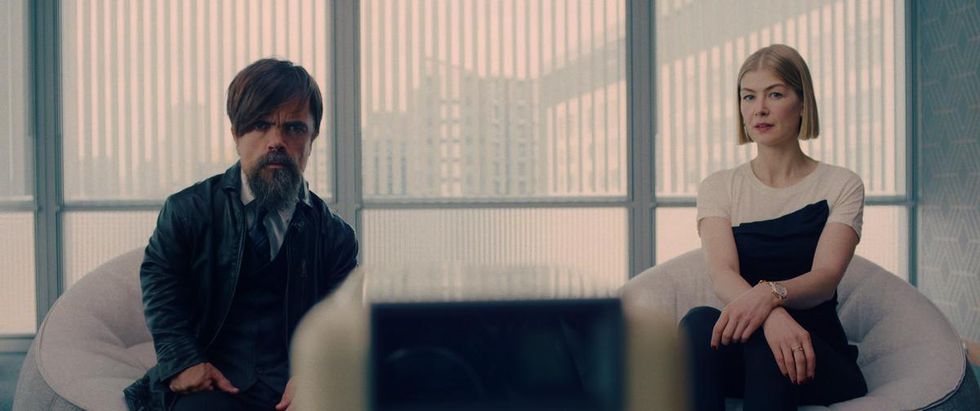
Girlboss Starterpack: This haircut, a pantsuit, and a vape
Contains Spoilers for I Care A Lot
I thought I knew how I Care A Lot would end just because it stars Rosamund Pike of Gone Girl fame.
Like Gone Girl, I expected Pike to come out on top, for her to go through the ringer in pursuit of her convoluted goals but end up with some version of the future she wants. In I Care A Lot, Pike’s character Marla Grayson expects this too.
I Care a Lot | Official Trailer | Netflixwww.youtube.com
The film follows a court-appointed guardian who games the system by taking advantage of the elderly people in her care, selling their assets, and manipulating the courts into trusting her over her clients’ families.
When Marla targets a woman with supposedly no family, no ties, and a sizable nest egg, she and her partner Fran (played by Eiza Gonzalez) think they’ve found a perfect, easy target — until it turns out her secret son has ties to the Russian mafia.
But despite facing constant threats from slick lawyers, disgruntled family members, and eventually the mafia, Grayson refuses to lose — especially not to a man.
“What a bad*ss,” the movie begs us to say. Immoral as she is, Marla is supposed to be an admirable anti-hero for her refusal to give in to the expectations, demands, or desires of men. She’s the token girlboss, and comes out on top despite everything — ending the movie with an international corporation and media attention.
Until, in the final scene, she gets shot and dies.
This fatal ending is complex because parts of it ring too true. Grayson’s rapid ascent to success is based on insidious exploitation, making her death feel earned, but her rise worryingly resembles so many #Girlboss feminists and the mega-corporations that are largely praised today.
And while real female-led corporations may not have such sinister roots, the hollowness of girlboss feminism’s “empowering” branding rings fatally true.

Girlboss Feminism Validates Oppressive Systems
In the movie’s opening monologue, Grayson expresses that “playing fair” is just rhetoric that rich people use to keep everyone else poor, and that to get ahead in this system means working it to your advantage.
In many ways, she is not wrong. Her logic propels her to exploit the unprotected in service of her own financial gain. Despite her disdain for rich male power figures, the film ends with Marla entering into a business partnership with the ex-Russian mafia man who attempted to murder her.
Her unlikely alliance embodies the reality of corporate feminism: it’s not about leveling the playing field or making the system more fair, it’s about reaching the status of the elite, no matter the cost. Grayson’s contempt for the system was, as with many rich white women, shallow and based only on her own exclusion.
If this sounds familiar, it’s because we’ve watched it play out in the success stories of so many businesswomen. Whitney Wolfe Herd, CEO of Bumble, began her career at Tinder, before suing them and starting her own company in what has been called “the greatest tale of corporate revenge.” Just this February, Wolfe Herd became the youngest woman to take a company public, making her a billionaire.
Yet her success comes in the middle of a global pandemic in which women, especially women of color, have lost the majority of all jobs. And Bumble’s brand of empowerment and not-Tinder has been long tarnished, especially after the 2019 discovery of “sex, drugs, misogyny and sleaze” at the company’s HQ, committed by the then-majority share owner, Andrey Andreev — a Russian billionaire.
Again, sound familiar?
The Fall of The #GirlBoss Icons — Too Little, Too Late?
Though Bumble’s CEO may have just gotten richer, some girlboss icons from earlier in the 2010s have fallen from grace to make way for an era more insistent on intersectional feminism, and results rather than enticing branding.
In The Cut’s post mortem of The Wing, the short-lived start-up that was ostensibly an Instagrammable We-Work for women, the success of the company was attributed to clever branding by its founder.
Audrey Gelman began her career in politics and used her skills as a political consultant to go from rebranding boring politicians, to rebranding the most boring concept of all: going to work.
Gelman’s focus on women, which led to her branding the space a feminist utopia, was the real genius. Launched on the day of the Trump 2016 election at a party that was supposed to be a Hillary celebration, the company was defined by the values of female empowerment — a marketing strategy that led to its rapid growth and cult status among career-driven millennial women.
But those outside those elite lines were less impressed. The Wing suffered first under the pandemic, then under the weight of the revelation that it wasn’t the utopia it claimed to be — especially for its employees.
This is a tale as old as June when many female-founded empires crumbled as the curtains were pulled back and the truth that these women were, in truth, just businesspeople rather than the harbinger of empowerment and equality they claimed to be.
For example, Leandra Medine Cohen of Man Repeller experienced the same fate when the company’s work environment was revealed to be similarly problematic. Its founder, too, was the subject of scrutiny along with the brand’s mission. What was once hailed as the pinnacle of girl-power — a brand dedicated to repelling men — felt outdated and hollow, and its ability to empower had faded in lieu of self-congratulatory branding.
The fall of major girl-boss/girl-power icons is a sign of the times. Mainstream feminism is moving away from a definition of female empowerment that lusts after the status and structures of corporations and capitalism.
The world of Lena Dunham’s Girls or founder of Nasty Gal, Sophia Amoruso’s story, Girlboss, seem so distant now, and I Care A Lot is an elegy to its pitfalls. The story buries a distant dream that corporate feminism will save us and reveals the truth: that it’s based on the impulse to save one’s self, often at the expense of anyone and everyone else.

The Revolution Will Not Be A Thriller Movie
Corporations are used to using pithy girl-power slogans as branding techniques, and even those without an iconic cult-of-personality to spearhead their brand image have bought in. And it’s no surprise that many of these companies and corporations are owned by men.
I Care A Lot itself was directed by a man, which feels obvious to anyone watching, as the most nuanced discussions about gender are overwritten monologues, overwritten misogyny, and an exchange featuring the phrase “she-doctor.”
It seems, to its writer/director J. Blakeson, that sexism is a series of pointed events and verbal abuse by easily recognizable “bad men,” when the reality is much less obvious. While the writing misses potential intricacies, Pike’s performance plays them anyway — the tenacity, the importance of perception, and mostly, the exhaustion that comes from being underestimated.
So there is a moment where you want Marla to make it, that split second before you see the gun but you know it’s coming. Not because you’re rooting for her, but because you know that she is merely a figurehead for a much more evil operation, and behind her is yet another man.
Whether intentional or not, I Care A Lot proves that it’s almost impossible to change the system from within, especially for people from marginalized groups — And that playing into the system you’re cynical about is doomed to fail.
And while I don’t need every movie to end in revolution (I’d prefer that be the fate of real life), it was only half satisfying to watch the hyper-capitalist girlboss character fail, since there was nothing in the film to root for.
Marla Grayson’s pitfall was seeing “money as a weapon.” The film’s pitfall was killing the anti-hero in service to what, the system? The very “play fair as the rich get richer” ethos that began the film?
So while J. Blakeson might have imagined his ending as the fall of an anti-hero that rights Grayson’s wrongs, there is no comeuppance for the system that Grayson began the movie critiquing. The film, then, serves as a cheap thrill that ultimately moralizes capitalism by holding her success as the pinnacle of achievement, and only faulting her for getting there the wrong way.
It’s ironic that the movie is titled I Care A Lot. In part, as the director seemingly intended, because Martha is gaming the care-work system and she herself does not, in fact care. But beyond that, beyond Blakeson’s scope, principles of care have long been the core of anticapitalist work.
From transforming carceral systems into communities based on prevention and care, to supporting the vulnerable, the work of activism tells a different version of the story where someone with Marla’s disdain for the rigged system causes her to want to change it, not be embraced by it.
So while so many people can agree with Marla, some go a route similar to hers, fed by cynicism, and others go the route she purported to go — one defined by community and care.
- Watch Netflix’s “The Platform” : Capitalism Is the New Horror Genre … ›
- What a Girl Wants – Popdust ›
- Butter is available on Netflix and is absolute must-watch – Popdust ›
- Why the Wellness Industry Wants Your Trauma: Gwyneth Paltrow … ›
- Best Movies Coming to Netflix in May 2020 – Popdust ›














